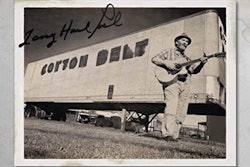Last Friday night, while waiting for sleep to finally come in Georgetown, Kentucky, I got a call from the Colonel. It was around 11:30. Seeing the name of his small Indiana town on the caller I.D., something told me, this is going to be good.
I'd been waiting for this conversation since January 6.
His words, though seasoned in bourbon, were measured and lucid. We had attended the same military school in our youth, though in different decades. He had gone on to a distinguished 20-year career in the U.S. military, having served in wartime and peace. I wound up out here. Still, when I’m jonesin' for a conversation that isn't a regurgitation of second-hand, copied-and-pasted drivel, the Colonel is my guy.
It seemed my insomnia and his current state of imbibery, as it were, made for complementary states of consciousness. After a couple minutes of catching up, he got right down to business.
"So what's your take on all that's been going on?" he said.
I don't remember everything I said. After more than a week of biting my tongue, I was as vexed by the posts of online acquaintances, inside and outside of trucking, who expressed solidarity with the desecrators of our nation's Capitol as I was by the insurrection itself. One social media friend had intimated that a second coup attempt was in the offing, and she was stockpiling food for that eventuality. Another prominent voice had demanded that we stop calling this a breach -- that those people had every right to storm in there.

Lock and load…, I so wish I could have been there, and plenty other mantras of seditionist chic were floating through the digital space uttered by people I once thought I knew well.
It was hard to put it all into context, hard to know just what to think. I told the Colonel about a book I'd been listening to via Audible, "Mortal Republic: How Rome Fell Into Tyranny," by Edward J. Watts. Watts maintains that the same structural issues that ended the Roman republic – an entrenched Senatorial elite, and politicians who incited mobs – were now upon us.
I referenced the Roger McNamee article in "Wired" that suggested social media platforms bore culpability for amplifying hate speech and actively recruiting millions of people to join hate groups.
In the end, though, I was probably just repeating things I'd heard myself, just as clueless as the next guy. So I turned it over to the Colonel.
"What's your take?"
There are reasons why the Colonel got to be the Colonel. One of those was his ability to look three moves ahead on the chess board. This was no sham colonel, such as the breed that has recently cropped up in the commonwealth south of our home state, where the title has come to be broadcast like so many Tootsie Rolls at a homecoming parade.
(In fact, according to a 2017 article in the Wall Street Journal, former Kentucky Governor Steve Beshear alone estimates having commissioned more than 100,000 Kentucky colonels during his two terms in office. I'm certain he meant well. But if you've ever been flim-flammed out of merchandise by some guy from Kentucky who insists on being addressed as Colonel, you might share my concern for the current state of the colonelcy. If you forget everything else I tell you, just remember this: Anyone who insists on being addressed as Colonel, unless his last name is Sanders or he has held that rank in the U.S. military, is going to give you problems before it's all said and done. Just sayin'.)
So back to the real Colonel. "I think it's time to rethink the union,” he said. “This thing is in our homes, now. It's in our small towns. This is unsustainable."
It took a moment for me to process. "Oh -- you mean The Union. Like, ‘the United States.’"
"There needs to be a type of Brexit. I'm not sure yet what it would look like."
He had been livid over the de-platforming of a sitting president by all the social media utilities and had briefly joined Parler out of protest. Yet he had seen his own small community torn apart by radical positions on both the right and left, all abetted by the amplification of social media.
And amid those thousands of voices bouncing around the internet, "Who do I know?" he asked. It really has become the question of the day. The magnitude of the stain on our lives left by social media, I suspect, will be at levels inversely proportional to the extent to which we committed ourselves to groups who could care less about us, while our families lay in ruins. People are waking up in jail today because they took their marching orders from groups that were recommended to them by Facebook, and leaders they had never previously met -- that much we now know.
According to McNamee, writing in that Wired story I mentioned earlier, as many as 2 million people could have been actively recruited to "pages and groups associated with QAnon extremism" by Facebook's algorithmic suggestions themselves, the platform then providing an infrastructure to plot an insurrection. But what about the cost the rest of us have paid? How much time do we devote to the fussy comradeships of peripheral people we encounter online? And how much time does that rob from those we care about the most?
"I know Paul Marhoefer,” the Colonel said. And he spoke about the good times our families had known together a lifetime ago, when there was still a normal.
So I ask you today, good reader, Who do you know? Having voted your conscience, isn't it time to pick yourself up, dust yourself off, and get back to work? Be there for your family, your close friends. Johnny Cash said it best, "Flesh and blood needs flesh and blood."
Don't take your marching orders from some loser on Facebook.










